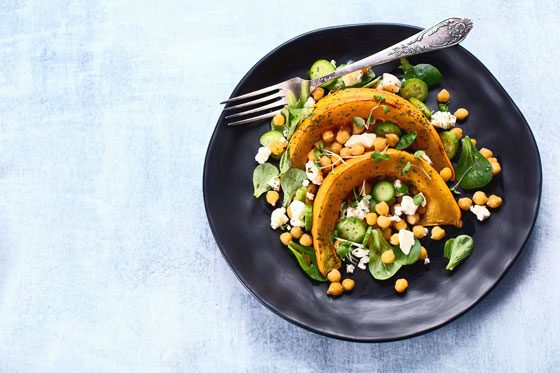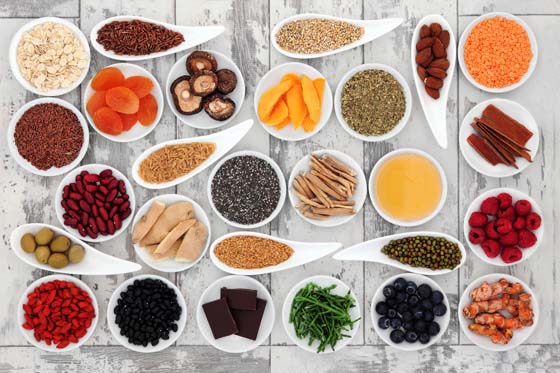
Yes, that's right, orange...although dark green and red would be equally good color choices to represent breast cancer awareness. These vibrant colors are found in foods that contain beta carotene, an important nutrient gaining notoriety for its role in reducing the risk of breast cancer. It is encouraged by the Institute of Medicine that women consume four to six milligrams of beta carotene each day. You might think this would require a truckload of carrots and spinach, but surprisingly this amount can be easily met and even exceeded with very reasonable portions. One cup of cooked spinach, kale or butternut squash contains at least 10 mg of beta carotene. Just one medium sweet potato contains two to three times the recommended dietary intake.
The overwhelming winner when it comes to foods that help lower cancer risk and support cancer survival are plant-based foods. The National Cancer Institute guidelines for cancer prevention agrees as well, recommending an increase of fruits, vegetables and whole grains in your diet, and a decrease in fat intake to less than 30% of all calories, and a minimal intake of cured, pickled and smoked meats. Bottom Line: Reduce foods from animal origin due to their fat content and increase plant foods that are rich in phytochemicals with antioxidant, antiestrogen and chemopreventive properties that may prevent cancer.
A reasonable goal to set is to consume five or more servings each day of fruits and vegetables. Excellent choices include broccoli, cauliflower, kale, cabbage and brussel sprouts along with the beta carotene rich yellow/orange fruits and leafy green vegetables. Seeing the many colors of the rainbow on your plate will assure that you consume a wide array of beneficial properties of plant foods. Remember, whole grains are a plant-based food as well. This includes wheat, oats, rice, corn, bulgur, barley, etc. Whole grains are great because they have high fiber content, which has a positive effect on hormonal-dependent cancers.

By reducing the higher fat content of meats and dairy, you won't necessarily be getting insufficient protein. Plant-based foods also contain protein in varying amounts. When there is enough variety of healthy plant-based foods, protein needs are easily met. Especially if foods such as soybeans, chickpeas, lima beans, and lentils are included in your soups, salads, stir fries, roasted veggies, pastas, etc.
A way to envision what meals might look like when moving toward a more plant-based diet is to consider a round dinner plate. Three of the four quarters of your plate can be made up of fruits, grains and vegetables. The fourth quarter can be for lean protein in the form of lean meats, fish or low-fat dairy. Meals don't have to be complicated. Start with your usual favorites and find ways to substitute plant-based foods into them.
Beyond diet, breast cancer prevention includes the importance of maintaining a healthy weight. Plant-based eating can help achieve this by being lighter in calories and higher in fiber. Another important caveat is to limit or eliminate alcohol. Breast cancer incidence goes up at one or more drinks daily. One standard drink includes 12 oz. of beer, 5 oz. of wine or 1.5 oz. of liquor. Preventing breast cancer with a healthy lifestyle is also a way to protect yourself against many other health threats such as heart disease and diabetes.
Don't Miss This Special Event:
To learn more about how lifestyle choices play a key role in reducing a woman’s risk, join us for a special Eating to Reduce Your Risk for Breast Cancer Wellness Presentation this month at Chester County Hospital.
Date + Time:
October 16, 2019 – 6:30 PM – 8:00 PM
Presenters:
- Breast Surgeon Catherine Porter, DO
Registration Required:
Call 610-738-2300 or Register Online.
Related Information from Chester County Hospital: